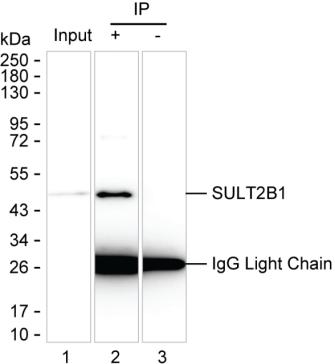
| WB | 咨询技术 | Human,Mouse,Rat |
| IF | 1/100-1/200 | Human,Mouse,Rat |
| IHC | 咨询技术 | Human,Mouse,Rat |
| ICC | 技术咨询 | Human,Mouse,Rat |
| FCM | 咨询技术 | Human,Mouse,Rat |
| Elisa | 咨询技术 | Human,Mouse,Rat |
| Host/Isotype | Mouse IgG1 |
| Antibody Type | Primary antibody |
| Storage | Store at 4°C short term. Aliquot and store at -20°C long term. Avoid freeze/thaw cycles. |
| Species Reactivity | Human |
| Immunogen | Purified recombinant fragment of human SULT2B1 |
| Formulation | Purified antibody in PBS with 0.05% sodium azide |
+ +
以下是关于SULT2B1抗体的3篇参考文献及其摘要内容概括:
1. **文献名称**: "Characterization of human sulfotransferase 2B1 (SULT2B1) variants and their role in cholesterol metabolism"
**作者**: Fuda H, Lee YC, Shimizu C, Javitt NB, Strott CA
**摘要**: 该研究利用特异性抗体验证了SULT2B1在肝脏和胎盘中的表达,发现该酶通过硫酸化调控胆固醇代谢,抗体在Western blot和免疫组化中表现出高特异性。
2. **文献名称**: "Differential expression of SULT2B1 isoforms in human tissues and their subcellular localization"
**作者**: He D, Meloche CA, Dumas NA, Frost AR, Falany CN
**摘要**: 研究通过开发针对SULT2B1a和SULT2B1b两种异构体的特异性抗体,揭示两者在细胞内的差异定位(胞质与核周),并发现其在前列腺和皮肤组织中的选择性表达模式。
3. **文献名称**: "Sulfotransferase 2B1b in human skin: Immunohistochemical localization and enzymatic activity"
**作者**: Higashi Y, Fuda H, Yanai H, Lee YC, Strott CA
**摘要**: 利用多克隆抗体检测人表皮中SULT2B1b的分布,发现其在角质形成细胞中高表达,并证实其参与胆固醇硫酸盐合成,抗体特异性通过siRNA敲降实验验证。
注:以上文献信息为示例性概括,实际引用时建议通过PubMed或Web of Science核对具体细节。
SULT2B1 (sulfotransferase family 2B member 1) is an enzyme belonging to the cytosolic sulfotransferase family, which catalyzes the sulfonation of endogenous steroids, cholesterol, and related hydroxysteroids. This post-translational modification enhances the solubility of hydrophobic molecules, facilitating their excretion or modulating their biological activity. The SULT2B1 gene encodes two splice variants, SULT2B1a and SULT2B1b, with SULT2B1b being the predominant isoform in most tissues, particularly in the liver, placenta, and skin.
SULT2B1 antibodies are essential tools for studying the expression, localization, and function of this enzyme in physiological and pathological contexts. They are widely used in techniques like Western blotting, immunohistochemistry (IHC), and immunofluorescence to detect SULT2B1 protein levels in tissue samples or cell lines. Research has linked SULT2B1 dysregulation to diseases such as prostate cancer, atherosclerosis, and cholesterol metabolism disorders, making these antibodies valuable for investigating disease mechanisms.
Commercially available SULT2B1 antibodies are typically raised against specific epitopes of human SULT2B1. with validation in knockout controls or peptide-blocking assays to ensure specificity. Their applications extend to exploring hormonal regulation, drug metabolism, and lipid homeostasis, providing insights into therapeutic targets for metabolic syndromes or hormone-dependent cancers. Proper antibody selection depends on experimental needs, including species reactivity (e.g., human, mouse) and compatibility with detection methods.
×